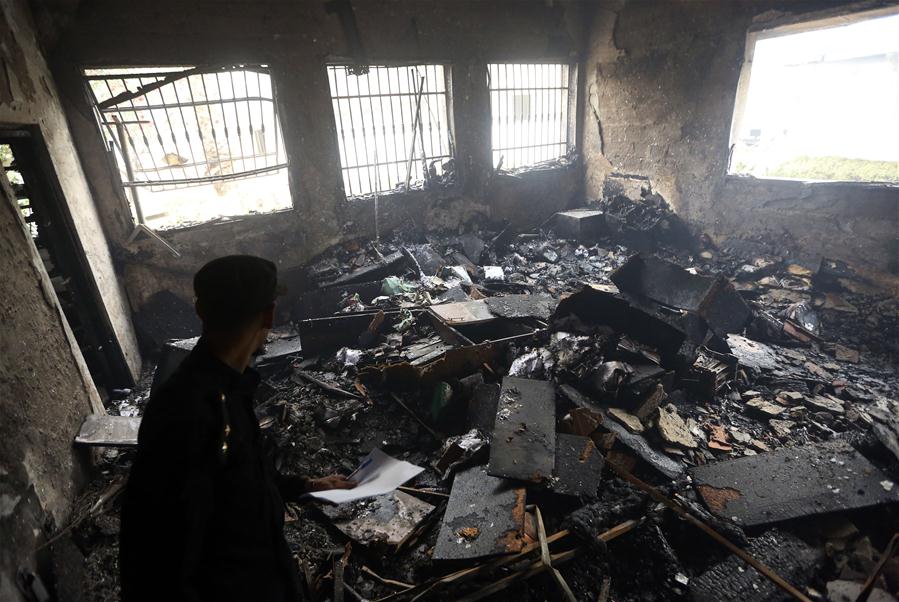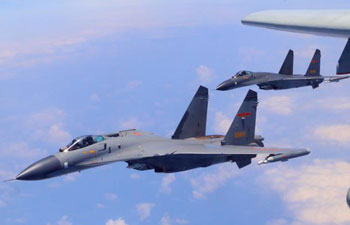
Photo taken on May 2, 2018 shows the interior of headquarters of Libya's Higher Commission of Elections attacked by suicide bombers in Tripoli, Libya. The death toll has risen to 14 in the IS suicide attack on headquarters of Libya's Higher Commission of Elections Wednesday, a medical source said. (Xinhua/Hamza Turkia)
TRIPOLI, May 2 (Xinhua) -- The Islamic State (IS) militant group on Wednesday carried out a deadly suicide attack on the headquarters of Libya's Higher Commission of Elections, killing at least 14 and injuring more than 10 others.
After the attack, rising smoke columns could be seen from the building's upper floor. In the surrounding area, there was no traffic movement and all shops were closed.
Nuri al-Zawi, owner of a supermarket only 100 meters away from the commission's headquarters, was sitting in front of his shop when he heard heavy gunfire from inside the building.
A few minutes later, loud explosions rocked the area.
"From the back street, cars bearing the logo of the central security entered quickly and headed toward the main gate," Al-Zawi told Xinhua.
"Another security force came and blocked the streets leading to the Commission's headquarters and diverted civilian vehicles' routes to byways for fear of car bombs or terrorists infiltrating and attacking them," he added.
The latest attack is the most violent one launched by the IS in the capital Tripoli in recent years.
The IS media arm Amaq tweeted a statement that the attack was carried out on the orders of the organization's spokesman Abu Hassan al-Muhajir.
In response to al-Muhajir's appeal, two suicide bombers, identified as Abu Ayyub and Abu Tawfiq, "targeted the centers of the infidels' elections and their supporters," the statement said.
The two attackers "detonated their explosive belts after they ran out of ammunition," it added.
Abdalhakim Belkhair, deputy head of the commission, told Xinhua that the building was severely damaged after a number of offices were set on fire.
The attack "seeks to send out clear messages attempting to thwart the upcoming elections in any way," he noted.
Libya's Interior Minister Abdussalam Ashour held a joint press conference with Imad al-Sayeh, head of the elections commission, to address the details of the terrorist attack.
"This cowardly terrorist act will not discourage the security services from continuing to secure all state facilities and carrying out their national duty," Ashour said, noting that a large-scale investigation has been launched into the attack.
"We have not yet determined the identity and nationalities of the terrorists. The investigation will reveal all the secrets related to it," he noted.
Al-Sayah said the database of the commission and the voter records were unharmed.
"The commission's database of voter records and our technical materials are safe, because we have a backup database and we can operate it within a few hours," he explained.
The elections commision "can organize any electoral process assigned to it, especially after the terrorist attack that increased our determination and strength," Al-Sayah said.
The chief of the election commision also called on all political parties to end differences to allow the Libyan people to exercise their democratic rights.
"If the political dispute continues, more innocent Libyans will fall in this way," he said.
The UN-backed Libyan government declared a three-day national mourning for the victims of the terror attack, saying "these crimes will only increase our determination to unite against them and to fight terrorism in all forms."
Egypt, Tunisia, Saudi Arabia, Jordan, the U.S., France, Britain and Italy have condemned the terrorist attack and voiced their solidarity with Libyans in their fight against terrorism.
The UN Support Mission in Libya (UNSMIL) called on the Libyan authorities to "prosecute and bring perpetrators to justice as fast as possible."
"Such cowardly attack on this democratic edifice is a direct aggression against the Libyan people and their will to build a just and civil state, and against their hope of finding ways out of the transitions to establish peace and stability across Libya," said Ghassan Salame, head of the mission.
The latest attack took place as the Libyan government, in cooperation with the UNSMIL, is preparing to hold presidential and parliamentary elections before the end of this year, as proposed by Salame in September 2017.
After ending the voter registration late in March, the elections commission announced on April 10 that 2.43 million Libyans registered for the upcoming elections, accounting for 53.26 percent of all eligible voters in the country.
Libya has remained in chaos following the 2011 uprising that toppled former leader Muammar Gaddafi. The country is struggling to make a democratic transition amid political division and unrest, as well as dominance of armed groups and militias with shifting loyalties.















